by Tom Watson.
« Page 1 Page 2
Tom: The good news is the Internet’s getting to the point where a niche can be large enough to make money.
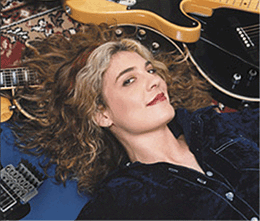 |
|
Janet Robin |
Janet: Absolutely. It’s starting to happen more for me now because of the Internet and getting the exposure I’m getting and being hooked up with companies like Taylor and Daisy Rock Guitars. Daisy Rock, especially, which is this company that markets towards young girls.
Tom: People connected to Daisy Rock introduced me to you.
Janet: That’s right. There you go. My head is so filled. I was on the news the other day with them on Channel 5, which is a big channel out here in L.A., KTLA News. They had me demonstrating some of their guitars and the news anchor interviewed me. They’ve been great to me. Great, great, great. I can’t say anything better. I did two DVDs for them.
Next year I’m coming out with a Janet Robin DVD that Alfred Publishing is going to produce. That’s going to be my own personal performance guitar DVD. The others were Daisy Rock books that I hosted. They’ve been incredible to me. And, you know, I support them. I mean, whatever it takes to get girls to play guitar. I also teach. I have a gaggle of a few students that I teach every week and I’d say at least 60% of them are girls.
Tom: It’s a little strange. There’s no problem with a female violinist, viola player, or even cellist, and the cello seems to require a kind of masculine pose, but guitar…
Janet: Guitar is a very male dominated world. However, if you the research about early female guitarists there were people like Memphis Minnie. She was the lead guitarist in her act. Her husband was the rhythm guitar player. She was not only a woman, she was black. And we’re talking back in the ’20s and ’30s when it was really unheard of for a woman to play guitar. I learned about some of this stuff from Michelle Shocked because I played with her for a little while and she’s a blues fanatic and very supportive of women. I did some work with her and she was very, very supportive of me.
Tom: You have a great quote from her on your site. She refers to you as “One of the best guitarists in the world, male or female.”
Janet: I know. I just love that she said that. She was great to work with. A little eccentric, but what artist isn’t? I did some stuff on a blues record that’s actually a tribute to Memphis Minnie. I don’t know when she’s putting that out. That was like over a year ago that I did that with her. We did this incredible session at her house with James Gadson on drums. I don’t know if you know who he is, but he’s the real deal. He played on Marvin Gaye’s stuff and all the old Motown stuff. So I walk in there, and there’s these two heavy-hitting black dudes, Michelle Shocked, and me. And I’m thinking I’m just going to play on the one Memphis Minnie tune that I have prepared. I did that, and then they were like, “No, no. You’ve got to stay. Play on some of the other stuff.” So, suddenly I was in the session all day with all these great session guys and it was awesome. She just let me do my bluesy thing. I wouldn’t say I’m a seasoned blues player, but I have my own version, my own Janet Robin version of the blues and she dug it. And the guys really dug it.
Then, I’m walking to my car and James Gadson comes up to me and he’s like, “Dude, man. You’re a good player. Can I get your card?” And I’m like, “You want my card? You want my card?” I mean, this guy’s like 75-years-old and he’s played on Marvin Gaye, Quincy Jones, all those things. I was really inspired by that. I learned a lot from Michelle about women musicians and women guitarists. She’s actually quite a pretty good guitar player herself in that style of music.
Tom: What’s your relationship with the blues? Electric? Acoustic?
Janet: Both. Definitely both. You know, the first stuff I learned was bluesy stuff with Randy, the minor pentatonic scale and the like. I still to this day fall back on that all the time. And Randy, contrary to what people think of him, was actually an insane blues player.
Tom: Oh?
Janet: Yeah. He was great. He could play it all – Clapton, everything. And, of course, Zeppelin, when you listen to Page, it’s all blues based. We would sit there and he would show me Page riffs and whatnot. He knew a lot of blues riffs, old blues, ’20s and ’30s style of blues playing and showed me some riffs like that. Then, when I started playing acoustic a lot more the last 10 years, I adapted some of that playing onto my acoustic. And it worked out pretty cool, electric or acoustic.
Tom: We talked about Mike Keneally. That reminds me of a story about you and Dweezil Zappa.
Janet: Oh, well, that was post Precious Metal, pre Lindsey Buckingham. The band broke up, I was floating around doing whatever and I went to a Heart show. I was backstage and I ran into Rudy Sarzo. He used to be the bass player in Quiet Riot and then he was the bass player in Whitesnake.
We’re talking backstage and I’m like, “Dude. Man, I used to take lessons from Randy Rhoads. I know who you are. I was a 12-year-old little girl at the Starwood watching you play.” And he thought that was charming and funny. He’s like, “You know, I’m putting together a benefit in Randy’s name at this club in L.A. Dweezil Zappa is going to be on it and various other people that are Randy Rhoads aficionados.” He was like, “I’d love for you to be involved in it. You actually took lessons from him.” I said, “Yeah. Absolutely.” So he invited me to be on the show and it became a thing where they paired up different guitar players together and I got paired up with Dweezil to do “Crazy Train”.
It’s a funny story. We worked really hard on getting that song together, Dweezil and I. We went to his rehearsal studio and, of course, it was pretty much all about him doing the solo. It didn’t matter that I took lessons from Randy. He was not going to give up the solo spot to me. I was like, whatever, dude. Screw it. So, I’m playing the rhythm behind him and we’re working the arrangements out.
We get to the gig and there’s all these people there and all this press and it’s a whole hullabaloo. We get on stage and it’s Dweezil on guitar, me on guitar, and I forget who was on bass and drums, but Ahmet Zappa was singing. We’re playing the song and we’re getting up to that point where it’s time for his Randy solo and his string breaks. He has a Floyd [Floyd Rose bridge] and you’re screwed when you break a string so I had to take over and I did my own solo.
Tom: Poetic justice?.
Janet: Oh, it was. And I didn’t learn Randy’s solo. Randy wouldn’t have wanted that. I did my own solo. That’s the thing I’m a sort of sad about, that he’s not around to see what he created because yeah, I did a lot of work, but he was so inspiring to me. I wish Randy was around to see what I’m doing now with the guitar.
Tom: What did Dweezil say about the solo?
Janet: He just schlepped it off. He tried to get the guitar tech to give him a different guitar but by the time he got it plugged in the solo was over and I’d already done it. [Laughs]
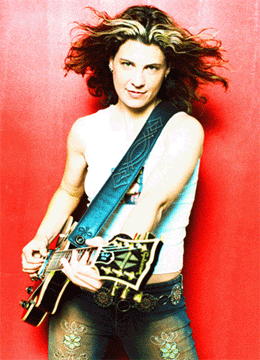 |
|
Janet Robin |
Tom: Let’s talk about your albums. The first, Open the Door, is recorded in 1998 with Renaissance Records. How did you hook up with Renaissance?
Janet: That was like a deal through Mara [Fox]. She knew somebody that was a fan of Precious Metal. All they really did actually was just a little bit of distribution. They got some of those records in some stores. It wasn’t a full-on record deal. I had started my own label, Little Sister Records, and signed a distribution thing with them. They got it online. That was the beginning of online distribution.
So, it was through Mara. I don’t know how many I sold, a couple thousand or something like that. It wasn’t a lot. But I did get some press from it and I had that record when I opened for Ann and Nancy [Wilson] and I got some interest. Somebody from a label saw me and Capitol was interested in me at one point, but the comment I got was, “We can’t sign another Lilith Fair artist.”
And I’m like, “What? What the hell are you talking about? It’s because it’s a woman with a guitar. You don’t even know what I’m doing. You have no idea what I do.”
Tom: Has Lilith Fair done more harm or good?
Janet: That’s a really good question.
Tom: Seemed like after Lilith Fair a woman with a guitar, especially an acoustic guitar, was pegged.
Janet: Well, I was back then. But the good thing is that the Lilith Fair opened up a lot of doors for women on radio because, like I said, when I was in Precious Metal we would go to radio and get, “We like your record and you girls are really sweet and everything, but we only have room for one female singer.” The MD would say, “We can’t play more than one woman vocalist on our roster.” Lilith Fair happened and all of a sudden you were hearing back-to-back women singers, Sheryl Crow with the Indigo Girls or whatever, or Meredith Brooks even. But before, you didn’t have that. Lilith Fair opened up a lot of doors for radio. And I think it caused people to take some women songwriters more seriously and whatnot.
So, I think in the end, it helped women. But I’m such a niche, I really am. And that’s why you had people like Ani DiFranco doing her own thing. I don’t know if people at a major label really get what she does, you know? I also fall into that void. A major label doesn’t really know what to do with a woman guitarist.
Tom: By 1998, you had reinvented yourself. You’re now the singer-songwriter.
Janet: Yep. Totally different than Precious Metal. Closer to what Lindsey did. I was going for it. I was turning down auditions and I was touring, booking my own tours. I didn’t have management yet or anything. I was doing my own thing, full-on independent, and just tried to make my way as a singer-songwriter.
Tom: Now you’re the vocalist. You’re not a background singer. You’re it. But that’s something you’d been working on for four to five years leading up to 1998.
Janet: That’s right. I was taking lessons. I was writing. I was recording at home. I had a little recording setup and I was doing all that crap at home. Just preparing myself. I really wanted to have good songs. It still took me quite awhile to really develop. I mean, I consider myself a much better singer now than when I came out with that record. My latest stuff, even up to what I’m doing now with David Bianco is way better as a vocalist than in 1998 when I came out with Open the Door. I really struggled as a vocalist. Guitar was my thing and song writing was my thing. It took me awhile to really feel confident and feel good about my voice, but I got there.
Tom: Where did you record Open the Door?
Janet: I recorded it at the home of my guitar player at the time, Mark Karan. He’s the guitarist now for Bob Weir’s band, Ratdog. We’re still good friends. He was another really inspiring, supportive male figure in my life. Really dug my guitar playing and my song writing. Really helped me with my vocals and all that.
Tom: At his house.
Janet: Yep. Well, we did the drums and bass at a studio. He had like a [Tascam] D88 [recorder] back then and we took all the tracks to his house and did all the overdubs there. It was really fun. We had a great time doing that record.
Tom: When did you start Little Sister Records?
Janet: That’s when I started it, when I came out with my first record. I needed a name for the label and Ani DiFranco was inspiring me with her little Righteous Babe label so I came up with that name because that’s what my brother – I have two older brothers – that played guitar used to call me. Little sister.
Tom: Does the track “Brother” from your Out from Under album refer to him?
Janet: Yes, it does. He’s always requesting I play that song. It’s about him, about being inspired by an older brother. It’s such a quirky little story, that song. It’s actually got Lindsey Buckingham-style fingerpicking going on a little bit and it’s in a D/G tuning, so it’s in alternate tuning.
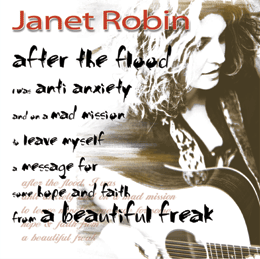 |
|
After the Flood |
Tom: In 2001 you record Out from Under and in 2004, After the Flood. The two albums have a very different feel. What happened between 2001 and 2004?
Janet: They do. Actually, my personal life had changed in a big way. I was out of a major relationship and I was a little fed up with the recording situation and paying so much money for everything. I’d done a lot of song writing and had all these really cool songs but it was so expensive to do a full-band record. I’d just gotten Mark [Sterling], my management, and we weren’t sure of our game plan yet but I wanted to come out with something because it had been awhile. There were a lot of reasons for that record [After the Flood]. I’d been touring acoustic without a band. People liked my other records, but often people want to buy what they see. Since I was out there with my guitar doing my thing, people were requesting just an acoustic record. So it just lined up. I had all these songs inspired from a breakup, I didn’t have much cash to do a full-band record, and management wanted something. So, I was like, “Screw it. I’ll just go do this acoustic EP.” I had a friend that had a Pro Tools setup in Laurel Canyon and it was so relaxed. The whole thing was so not stressful.
Tom: You often tour with basically you and your guitar and then play with a full band when you’re in L.A., right?
Janet: Right. There are times when I play with less than a full band in L.A.. Actually, I don’t play in L.A. that much anymore. I play about every six or seven months in town. It depends on the gig – sometimes I’ll have the full band and sometimes I’ll have a trio or even just my guitar player. But I do try to do the full rock band thing in L.A. because it’s nice to play with all the boys since I don’t get to do it on the road, you know?
Tom: It’s just a fact of life that it’s easier to make a little money as a solo than if you have to take a whole band on the road.
Janet: That’s definitely a main reason I can’t take a whole band. I just can’t afford it.
Tom: Sometimes people don’t realize that’s just the way it works.
Janet: No, they don’t. I have to put them up in hotel rooms and get a bigger rental car and all the above.
Tom: Food, transportation, payroll…
Janet: Yeah. Salary. I can’t do it. So I go out alone. I don’t take anybody. One time Mark [Karan] came out with me on the road. I’ve been doing it so long and have so many other friends and musicians I hook up with that it’s not as lonely as it used to be. Now, it’s just another job that I have. When I do gigs like in Santa Barbara or Joshua Tree or places that are only a couple of hours away, I’ll usually have one of my band members come with me. I’m starting to branch out because I’m making a little bit more money now to afford to do that. And it helps, too, in the show. It’s nice to have somebody on stage next to you.
 |
|
Janet Robin |
Tom: Well, you know, Janet, you’re a survivor.
Janet: That’s what they say.
Tom: Especially living in L.A., which can be a tough town.
Janet: I know. It’s been a little bit of a tough road.
Tom: What advice would you give younger players, especially women?
Janet: It’s the same advice that my parents and other mentors in my life gave me. Don’t give up. And don’t settle for your craft. You have to always get better. You can’t rest on any laurels.
Tom: What do you think it is, though, that allows you to not give up? I mean, it’s easy to say and it’s good advice, but it’s awfully hard to folllow.
Janet: I know, it’s very cliché. The thing is, you really have to have an inner passion for music because there’s so much bullshit that you have to put up with in this business. People telling you crap, you suck, blah, blah, blah. Whatever. Or technical things like being on the road and getting a flat tire or there’s no PA at the gig. It’s just problem after problem so that if you don’t like what you do down to the bone you’re not going to be able to survive those kinds of things.
You’ve got to have that inner passion and an inner motivation. What is the first reason or the bottom line reason that you got involved in music? Is it because you love music? Do you love how it makes you feel, how it can keep you company when you’re lonely or how when you are with somebody you love it can make you feel a certain way? Or how a song can remind you of a certain time in your life, just like how you smell something and it’s like, “Oh, I remember that smell from when I was 12.”
It’s very sensory to me. It’s in my blood and I can’t think of doing anything else. Look, some people get into the music business because they want to be rich and famous and I won’t lie and say I don’t want money. Of course I want to live comfortably and I want validation, but I don’t want validation or fame just to have it. I want it because, oh, she’s a great musician or she’s a really skilled guitarist or songwriter. I want it for a reason. Not like, nothing against her, Madonna, but some people think that way. And you know what? By all means, go for it. She did and she has an amazing career and she’s an amazing businesswoman. I don’t think of Madonna as a musician though.
Look, it’s a music business. It is. And if you can find some balance between knowing that it’s a business along with there’s a little bit of an art form still left in it, then you’re going to be okay. You’ve got to keep doing it because you love it, not because you want to make a lot of money and become famous. But it’s okay to have that motivation, too. You’ve just got to balance them both.
Tom: Another thing that strikes me about your career is versatility. What can’t you play?
Janet: Last night I was playing in my friend’s band. She plays rap/soul.
Tom: That’s what I mean. You can play a lot of different styles. You can play electric, acoustic…
Janet: Yep. I can play anything. That’s the other advice I would give to players. Make sure you’re well versed in all styles. And you know what? Somebody asks you a question, never say no. “I really need you to play slide guitar in this part.” Don’t say, “Oh, I can’t play slide.” Don’t ever say no. Just say yes. You say yes and worry about it later.
Tom: Never let ignorance stand in your way.
Janet: No, no. I learned that. You say yes. “Do you think you can sing this part?” If it’s opera, don’t say no. Go take opera lessons.
Tom: The life of a working guitarist is often, whatever it takes.
Janet: Absolutely. And if you don’t know fingerpicking, then you’d better go take a class if you’re serious about your instrument and being a really good guitarist and having opportunities. Look, I might get a call to be in Prince’s band. I’d better be ready for that. I wouldn’t say no to that gig. On the other hand, I could get called to be in the Lucinda Williams band. Totally different kind of music. I can play both. And you’d better be that kind of player because otherwise you won’t survive. That’s why I had all these different kinds of gigs. I went from a glam rock band to a Lindsey Buckingham style – you know that kind of rock/folk thing – and then Meredith Brooks, total pop, and then Michelle Shocked, which is like alternative blues. You’d better be good at all of it.
Tom: What can you tell me about the new album you’re working on?
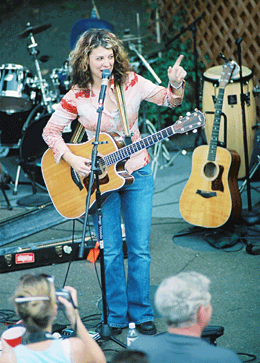 |
|
Janet Robin. Photo by George Stenberg. |
Janet: I’m really excited about it. I’m working with these two producers, David Bianco, who has tons of creds and he’s awesome. And then Steve Baughman, who comes from a totally different world – rap music. That’s what he works at, but what he loves and what he listens to is my style of music. So he’s been looking for a project to do. It’s the three of us producing together with enormous respect for each other. They’re the first two guys, men, and I say this honestly, that I’ve worked with that are not trying to put me in a box. They’ve seen me play live. Steve actually came to me as a fan. He’s seen me many times and is impressed by my guitar playing. He really wants to make sure it gets down on the record in the best way possible and in a more professional way than I’ve been able to do on my own.
They’re also pushing me to be more of a singer – a singer with vibe, a singer with charm – whatever my voice is to find that voice. I’ve learned a lot working with them over the last year. They’ve been completely picky-picky about everything. The other day, I was doing my third guitar solo on the same song because the other two weren’t cutting it.
Tom: Nothing beats working with professionals.
Janet: Nothing beats it. Another thing they showed me – you can’t rest on anything. “Well, why aren’t these solos good enough?” Well, I guess I need to practice more. I need to sit at home and work out some more things.
Tom: What kind of an album is it? More electric?
Janet: This album’s going to be more full band. But the concept behind it, since I play so much acoustic and have so much of an unusual or let’s say more of an edgy acoustic sound, we wanted to put that on the record and get it to be like “Janet playing acoustic guitar with a band behind her”. That’s actually how my live shows are. So we didn’t want to go and do this over-produced thing. It’s very minimal, doubles here and there. Some tracks are just acoustic guitar, bass, and drums.
Tom: So it’s still easy to take on the road.
Janet: Easy to take on the road, easier to sell. I wouldn’t be embarrassed about selling it because it has a band on it and I’m playing alone. It sounds like After the Flood except with a band. And the songs are obviously newer and my vocals have escalated a lot. They pushed me a lot in that area. I also did some co-writes with some new writers.
Tom: Like who? Anybody you could … ?
Janet: Marcy Levy. I wrote a couple of songs with her on this record. She co-wrote “Lay Down Sally” with Eric Clapton and George Terry. She’s an amazing songwriter and we had a ball writing songs. I opened up my vision a little bit with my writing and I think it’s going to be great. Right now, we’re only working on half of it. We haven’t sold it yet so the plan is to finish this half of the record and they have some people they want to get it to. There’s already a few people that are interested in hearing it. So that’s good news. The plan is to get them to want to finish the second half.
Tom: Is there a working title?
Janet: No working title.
Tom: It’s called Next Album.
Janet: Janet Robin: Next Album. Janet Robin: Finally. I have no idea.
Tom: Having no title worked for Led Zeppelin 4.
Janet: Exactly. I do think it’s going to be one of the closest records that sounds like what I’m sort of about whether you see me alone or with a band. And that was the whole idea behind this. That and really concentrating on making the songs the best songs that I could be doing right now.
Tom: What in the world is a banjitar?
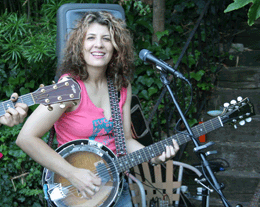 |
|
Janet Robin with her Gold Tone banjitar |
Janet: Ooh. Good question. Did you see the picture?
Tom: Sure did.
Janet: Basically, it’s a banjo. It’s built with all the specs of a banjo but it’s a six-string banjo and you tune it like a guitar. You can tune it however you want. I happen to tune it like a guitar so I play it like a guitar, but it sounds exactly like a banjo.
Tom: Do you own the instrument?
Janet: A good friend of mine bought it for me as a birthday present several years ago and I use it in my show. Actually, it’s on this record. I use it in some extra backing tracks on this new record. I also play it on a song called “Flood” that’s on my After the Flood record. When I play that song live I don’t even use my acoustic guitar anymore I just use the banjitar. I do this cool thing at the end of the song where the banjitar is plugged into my wah-wah pedal and I do this kind of rocking wah-wah banjitar thing. It’s cool, Tom. You would love it. People go nuts. It’s like Jimi Hendrix rolling over in his grave. [Laughs]
Tom: Who made the banjitar?
Janet: Gold Tone is the company. There’s a couple – Deering also makes one, but Gold Tone is the one that I have. It’s really great sounding. It’s got a built-in pickup and it’s awesome, man. I love it.
Tom: You also used a toy accordion on one of your …
Janet: Oh, yeah. I used that in both of my first two records. I picked up some things from Lindsey. He’s so crazy and eccentric with recording. He’ll record himself pounding on a couch and that’ll be his kick drum. I picked up some quirky things from him and just thought it would be fine with the different guys that I was working with. “Oh, let’s try accordion. Or let’s bang on the doorknob” or whatever. I’m not so sure that’s all my style but I think it’s good to experiment.
Tom: And it’s fun.
Janet: It’s fun. And I think with making music and making any art, it’s always evolving, always changing and evolving. You learn something new from somebody you go see and you get inspired. That’s what it’s about, you know? Otherwise, it’s really boring.
Tom: It doesn’t hurt to lighten up now and then and just have a good time.
Janet: Not at all. I love it. I have a major sense of humor. In my stage show my banter in between songs is just all about … it’s just funny. I talk about some of my personal life and going to therapy and what does this song mean. I really try to make it personal so people can be in my world for the hour of the show.
Tom: A 10-year-old girl wants to know what lies in the future if she became a guitarist. What do you tell her?
Janet: Hell. [Pauses] [Laughs] No, I’m kidding. Man, I think things are going to get better for women, especially with companies like Daisy Rock. Look at all the publicity they’re getting. I have so many more women guitar students, young girl guitarists, that are taking from me.
Tom: Are you teaching privately or with a studio?
Janet: Privately. And it’s just word-of-mouth. I don’t put an ad out or anything. So, yeah, ten years from now, when she’s 20, I mean, it’s going to be awesome. That’s the way I see it. There’s going to be a lot more women playing. It’s not going to be like, “Oh, there’s a girl with a guitar,” or, “You’re pretty good for a girl.” You’re not going to hear those comments. I would like it to be that way. There’s a lot more opportunities for girls these days.
Tom: 30 years ago, if a white band had a black guitarist, sometimes you’d read, “And the black guitarist, so and so.”
Janet: Exactly. Jimi Hendrix had to go to England to make it.
Tom: There’s still a tendency to say, “So and so, the female guitarist,” right?
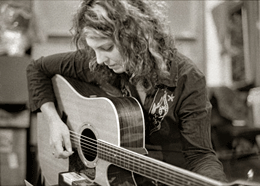 |
|
Janet Robin |
Janet: There still is. And I can’t say for sure 10 years from now that that’s going to be different, but I think it is. I think it’ll be a little more commonplace. I’m in a side project, I don’t know where it’s going, with these three black women and I’m the only white chick. It’s like this rock/soul band. Like a female version of Living Color. It’s being managed by Andre Recke who is Hilary Duff’s manager. His wife is in this band, actually. She’s the drummer. We’re just writing right now and I don’t know where it’s going to go, but these women are kickass. This girl, Bikki, plays bass and she’s a kickass bass player. The singer is this woman, Jill. She’s like Tina Turner. And the drummer is this woman, Shauney. She’s awesome. I can’t imagine being a black female musician. That’s hard too, you know?
Tom: What other guitarists do you think people should pay attention to?
Janet: Do you know who Sue Foley is?
Tom: Sure.
Janet: Blues guitarist. She’s writing a book about women guitarists. I’m in it along with all these other people. She’s in the midst of writing it right now.
My friend Anne McCue. She’s a great blues guitarist/slide player. Kind of Americana music. I happen to have a song with her that we co-wrote. She has a record [Koala Motel] out right now on Messenger Records and we wrote a song called “Driving Down Alvarado”. It’s actually the single in the U.S. and it’s being played on some stations out here. She’s a great guitarist. She’s around my age.
Shannon Curfman. Remember her? A couple of years back she was signed to Arista. She’s a quite good guitar player for the blues. She’s young. She’s like 21 or something.
And Kaki King. She’s amazing, you know, for that finger-style stuff. I talked with her and I saw her play.
Tom: What are you doing with Daisy Rock? Are you endorsing them or …?
Janet: I endorse them and I do clinics for them sometimes. Like I have a clinic coming up in a couple of weeks. And promotional appearances. For instance, we were on the news the other day. And then also CNN did something a few months back. I did that with them.
Tom: What Daisy Rock guitar do you use?
Janet: I love their 12-string. It’s this white, semi-hollow body 12-string. I use it in my show when I play with my band. It sounds great.
And I’ve done a couple of DVDs for them, like I told you, and then I’m going to do another one. Alfred Publishing’s connected to Daisy Rock so Alfred produces the DVDs. I did those two instructional ones for them already and I’m going to do a third one, but that’s going to be a separate Janet Robin thing. We’re hoping really to get a lot of press from that.
Tom: Are those first two out already?
Janet: No. They’re still being edited. That should help a little with promotion. I think we’re looking for the main promotion from the one that I’m going to do. They don’t have a woman DVD guitarist in their library. I’m the first and I haven’t gotten a lot of press as a woman guitarist. When I was in Precious Metal I got some, in some of those rock rags and stuff. But since then I just really haven’t gotten a lot of guitar-specific press like Guitar International or Acoustic Guitar magazines.
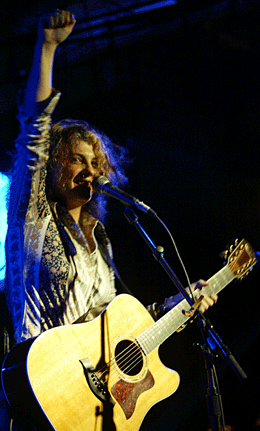 |
|
Janet Robin. Photo by Paul Parks. |
Tom: Women don’t get much media exposure.
Janet: No. And we’re hoping to change that.
Tom: They’re not in the media forefront.
Janet: I know, I know. Well, we’re hoping to change that. I want to get some more. I mean, I haven’t ever been in Guitar Player magazine. There’s only been three women on the cover of that magazine.
Tom: Things change.
Janet: It’s just really pathetic, and I hate to say that, but it is. I’m hoping that the next three years will really open up for me. I’m hoping things will change. Like yourself, doing this article, it’s a start. Wherever we can get it, you know?
__
« Page 1 Page 2
Related Links
Janet Robin
Janet Robin on MySpace
Official Randy Rhoads Web Site
Randy Rhoads (Wikipedia)
Precious Metal on MySpace
Mara Fox
Precious Metal on Rocket City Records
Ann & Nancy Wilson (Heart)
Lindsey Buckingham
Lilith Fair
Meredith Brooks
Mike Keneally
Sue Foley
Anne McCue
Shannon Curfman
Kaki King
Taylor Guitars
Daisy Rock Guitars
Gibson Guitar
Alfred Publishing
More articles by Tom Watson